Hermanos Sin Fronteras
Es difícil comprender que este es mi ultimo reportaje y que ya se acabó mi semestre aquí en Colombia. Hay muchos temas que me gustaría abordar en este reporte pero me parece importante hablar de un grupo de voluntariado universitario que ha sido integral a lo largo de mi intercambio. El grupo de voluntariado se llama “Hermanos Sin Fronteras” (HSF) que pertenece a la Universidad de Los Andes y busca mejorar la experiencia de los estudiantes de intercambio. El grupo está conformado por 16 estudiantes uniandinos de varias carreras y diversos intereses que, de manera voluntaria, nos han ayudado a integrarnos en la Universidad y la cultura colombiana. El grupo se liga con la oficina de internacionalización de la Universidad de los Andes, pero no actúa oficialmente en nombre de la Universidad, así que puede organizar actividades espontáneas sin tener que cumplir con los varios tramites que exige una institución como Uniandes. De hecho, según Camilo Pava, hermano sin frontera y estudiante de administración, “la independencia que tenemos de la universidad es lo que más nos da ventajas … entre más libres e independientes nos dejen, siempre y cuando nos den publicidad y mercadeo, mejor.”
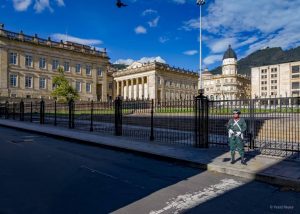 Además de jugar un papel importante en los días de orientación, HSF nos han ayudado con la burocracia agotadora que se requiere para instalarse en un nuevo país y realizar un intercambio. Por ejemplo, nos han ayudado en renovar nuestras visas, conseguir planes para nuestros celulares, inscribirnos en módulos, pedir citas médicas y conseguir artículos domésticos. Aunque estos quehaceres parezcan triviales, a veces puede resultar complicado realizarlos cuando acabas de llegar a otro país y no tienes un manejo fluido del idioma. Cuando más me desesperaba era cuando no podía realizar las pequeñas cosas cotidianas o cuando estaba inundado con un sinfín de trámites que traían consigo inconvenientes pequeños. Dificultades como no poder pagar tu factura de móvil porque la empresa no acepta tarjetas extranjeras, o no poder tomar una tasa de té porque no sabes donde comprar un hervidor contribuyen al choque cultural. Gracias a HSF, hemos superado estos problemas con mucha más tranquilidad. Además, a través de sus diversos medios de comunicación, como Whatsapp, Email y Facebook nos han mantenido informados sobre la actualidad del país, avisándonos sobre las novedades en Bogotá y aconsejándonos sobre eventos pesados, como los recientes días de paro en Bogotá.
Además de jugar un papel importante en los días de orientación, HSF nos han ayudado con la burocracia agotadora que se requiere para instalarse en un nuevo país y realizar un intercambio. Por ejemplo, nos han ayudado en renovar nuestras visas, conseguir planes para nuestros celulares, inscribirnos en módulos, pedir citas médicas y conseguir artículos domésticos. Aunque estos quehaceres parezcan triviales, a veces puede resultar complicado realizarlos cuando acabas de llegar a otro país y no tienes un manejo fluido del idioma. Cuando más me desesperaba era cuando no podía realizar las pequeñas cosas cotidianas o cuando estaba inundado con un sinfín de trámites que traían consigo inconvenientes pequeños. Dificultades como no poder pagar tu factura de móvil porque la empresa no acepta tarjetas extranjeras, o no poder tomar una tasa de té porque no sabes donde comprar un hervidor contribuyen al choque cultural. Gracias a HSF, hemos superado estos problemas con mucha más tranquilidad. Además, a través de sus diversos medios de comunicación, como Whatsapp, Email y Facebook nos han mantenido informados sobre la actualidad del país, avisándonos sobre las novedades en Bogotá y aconsejándonos sobre eventos pesados, como los recientes días de paro en Bogotá.
Asimismo, Hermanos Sin Fronteras han organizado varias actividades y excursiones que nos han dado la oportunidad de hacer amigos y conocer el país, entre ellas: un “potluck” almuerzo, un grafiti tour, un club de poesía, un viaje a Villa de Leyva para un festival de cometas, un desplazamiento a la laguna de Guatavita y las minas de sal en Zipaquirá, una fiesta de bienvenida y despedida, salsa cada miércoles, senderismo, conciertos, excursiones a los jardines botánicos, catas de cerveza, partidos de fútbol y sesiones de “jamming” y rap. Estas actividades se han desempeñado con el propósito de incorporarnos en el país y combatir la soledad que puede ser una de las fuentes más significantes de la tristeza que implica estar lejos de casa. Según Camilo, los varios intereses de cada voluntario de HSF crean “una sinergia que es muy chévere porque cada uno está loco en lo que le gusta y en su vuelta.”
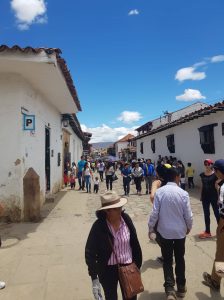 De manera importante, estas actividades han proveído un foro para mejorar nuestro español ya que todos los Hermanos son colombianos y nos hablan en español. Cuando he platicado con amigos de intercambio Erasmus, me han dicho que ha sido muy difícil integrarse con estudiantes locales y que cuando en efecto hay eventos de integración, el inglés predomina. Camilo, quien fue de intercambio a Holanda, me dijo que, a diferencia de los HSF, con Erasmus nunca tuvo contacto con “la parte más profunda y humana.” Destaca que en HSF, “la idea es no solo mostrarles [a ustedes] la cuidad, la universidad y farrear, sino hacer amigos. Según él, lo importante es “no solo verlo como una transacción comercial que [ustedes] son nuestros clientes y tenemos que darles la mejor fiesta, la mejor todo, sino que son amigos, son personas, son parceros.”
De manera importante, estas actividades han proveído un foro para mejorar nuestro español ya que todos los Hermanos son colombianos y nos hablan en español. Cuando he platicado con amigos de intercambio Erasmus, me han dicho que ha sido muy difícil integrarse con estudiantes locales y que cuando en efecto hay eventos de integración, el inglés predomina. Camilo, quien fue de intercambio a Holanda, me dijo que, a diferencia de los HSF, con Erasmus nunca tuvo contacto con “la parte más profunda y humana.” Destaca que en HSF, “la idea es no solo mostrarles [a ustedes] la cuidad, la universidad y farrear, sino hacer amigos. Según él, lo importante es “no solo verlo como una transacción comercial que [ustedes] son nuestros clientes y tenemos que darles la mejor fiesta, la mejor todo, sino que son amigos, son personas, son parceros.”
Cuando pregunté a Camilo si HSF tiene espacio para mejorar, afirmó que “en cuanto a la razón de ser de lo que somos como grupo estamos muy bien, ya estamos muy claritos en eso. Pero nos falta desarrollarnos como organización, que es lo que tienen allá en Europa…todavía estamos muy informales en cosas, con mucha improvisación…de pronto nos falta formalizarnos entre nosotros, organizarnos más.” De acuerdo con lo anterior, el grupo tiene la visión de que “para el año 2025 HSF será reconocido a nivel institucional como un grupo de participación estudiantil consolidado, conformado por voluntarios uniandinos que buscan mejorar la experiencia tanto de sus miembros como de los estudiantes extranjeros y nacionales de intercambio desde diferentes ámbitos. De igual forma, a nivel internacional, se conocerá a HSF como un referente para grupos de apoyo a estudiantes extranjeros en diferentes universidades del mundo.”
En conclusión, Hermanos Sin Fronteras han sido muy importante para el goce de mi estancia en Colombia, y solo al hablar con otros amigos de intercambio he dejado de dar el grupo por hecho. Su amabilidad, dedicación y apoyo me han estimulado a unirme a un grupo parecido en el Reino Unido para que estudiantes extranjeros allá puedan disfrutar de su intercambio como he hecho yo. A Camilo le pareció importante mencionar: “yo sé que Colombia tiene una imagen en países que no es la que debería ser por muchas razones…. parte del cambio que podemos hacer nosotros es que los que vengan acá se lleven la mejor imagen posible de Colombia y que vivan la mejor experiencia, así como yo la viví cuando me fui de intercambio.” Esta actitud resume la intención de Hermanos Sin Fronteras y atestigua su valor, no solo para nosotros extranjeros, sino para el país también. Para terminar este último reportaje y mi estancia en este hermoso país, cito a Camilo:
“Que vengan a Colombia, es una chimba.”
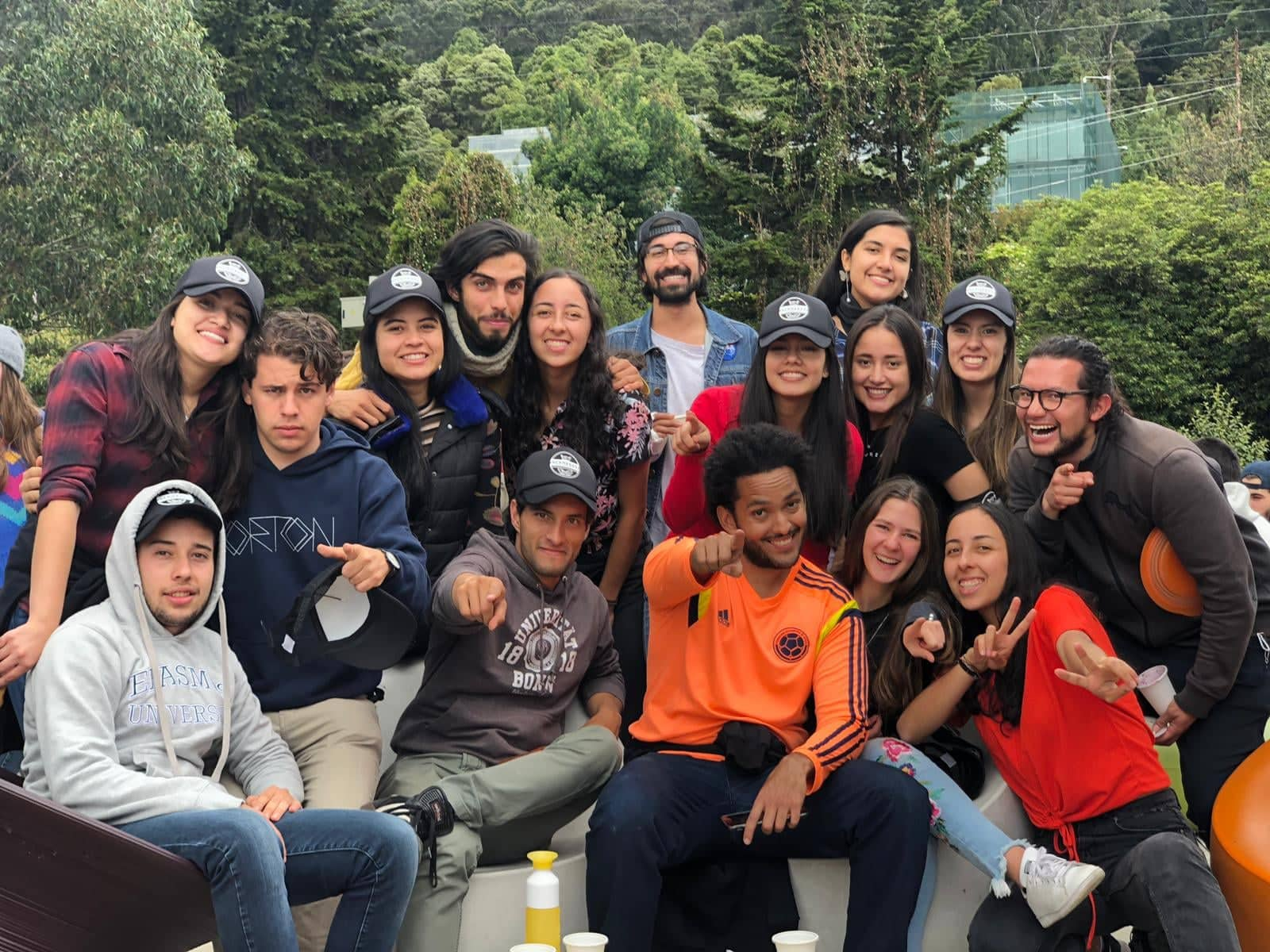
It’s hard to understand that my semester here in Colombia is coming to an end. There are lots of subjects that I would like to write about in this report but it seems to me important to discuss one of the University’s voluntary groups, which has been integral throughout the duration of my exchange. The group, which is associated with the Universidad de Los Andes, is called Hermanos Sin Fronteras (HSF) or “Brothers Without Borders” and seeks to improve the experience of the University’s exchange students. The group consists of 16 Uniandes students who study various degrees and have diverse interests. Unpaid, they have helped us integrate into the University and Colombian culture. The group is linked with Uniandes’ internalization office but doesn’t act officially on behalf of the University, and is thus able to organize spontaneous activities without being restricted by the processes and protocols to which an institution like Uniandes is bound. In fact, according to Camilo Pava, hermano and business student: “the independence which we have from the university is what most gives us an advantage…the more free and independent they let us be, on the condition that they give us publicity and marketing, the better.”
Beyond playing an important role in the induction days, HSF has helped us with the exhausting bureaucracy that is required in order to settle into a new country and complete an exchange. For example, they’ve helped us renew our visas, buy phone plans, enroll in modules, arrange medical appointments and buy household items. Although these tasks seem trivial, sometimes it can be hard to fulfill them when you’ve just arrived in a new country and don’t speak the language fluently. I felt most hopeless when I couldn’t get the small daily bits and bobs done or when I was overwhelmed with filling out documents which brought with them unforeseen challenges. Setbacks like not being able to pay your phone bill because they won’t accept foreign credit cards or not being able to have a cup of tea because you can’t work out where to buy a kettle contribute to culture shock. Thanks to HSF, I managed to overcome these troubles with ease. Moreover, through their various communication platforms, like Whatsapp, Email and Facebook they’ve managed to keep us informed about Colombian current affairs, let us know about news in Bogotá and advised us about potentially dangerous events like the recent strikes in Bogotá.
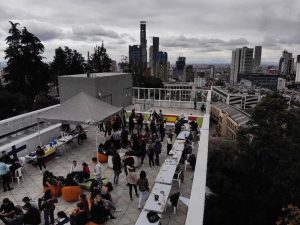 Further, HSF organised various activities and trips, which gave us the chance to make friends and get to know the country. To mention just a few: a potluck lunch, a graffiti tour, a poetry club, a trip to Villa de Leyva for a kite festival, a daytrip to a lagoon in Guatavita and the salt mines in Zipakirá, a welcome and leaving party, salsa every Wednesday, hillwalking, concerts, trips to the botanic gardens, beer tastings, football matches and jam and rap sessions. These activities have been carried out with the aim of integrating us into the country and community and fighting loneliness, which can be one of the biggest sources of feeling homesick. According to Camilo, the diverse interests of each HSF volunteer creates “a really cool synergy because each individual is crazy about what they like.”
Further, HSF organised various activities and trips, which gave us the chance to make friends and get to know the country. To mention just a few: a potluck lunch, a graffiti tour, a poetry club, a trip to Villa de Leyva for a kite festival, a daytrip to a lagoon in Guatavita and the salt mines in Zipakirá, a welcome and leaving party, salsa every Wednesday, hillwalking, concerts, trips to the botanic gardens, beer tastings, football matches and jam and rap sessions. These activities have been carried out with the aim of integrating us into the country and community and fighting loneliness, which can be one of the biggest sources of feeling homesick. According to Camilo, the diverse interests of each HSF volunteer creates “a really cool synergy because each individual is crazy about what they like.”
Importantly, these activities have provided a forum for improving our Spanish given that all the hermanos are Colombians and speak to us in Spanish. When I’ve spoken with friends on Erasmus exchanges they’ve told me that it’s been hard to integrate with local students and that when there are integration events, English dominates. Camilo, who went on an exchange to Holland, told me that, in comparison to HSF, with Erasmus, he never had contact with the deeper, more human aspect. He emphasises that in HSF, “the idea is not only to show you guys the city, the university and to party, but to make friends.” According to him, the important thing is “not only to see it like a business transaction in which you are our clients and we have to put on the best fiesta, the best of everything, but that you are people, friends, parceros.”
When I asked Camilo if HSF had room to improve, he said: “in regards to our reason to be, what we are as a group, we’re good, we’ve got that clear. But what we need is to develop as an organisation, like what they have there in Europe…we’re still pretty informal in a lot of things, with a lot of improvisation…perhaps we need to formalise ourselves, organise ourselves better.” In relation to this, the group has the vision that “by 2025, HSF will be recognised on an institutional level as a consolidated student group, made up of Uniandes volunteers which looks to improve the experience of their fellow members as well as that of exchange students – foreign and compatriot.” Equally, on an international level, it’s hoped that HSF will be known as a reference point for international student support groups in different universities worldwide.
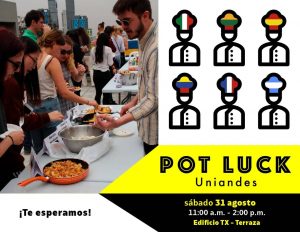 In conclusion, HSF has been a very important part of my enjoyment of Colombia and only upon speaking with other friends on exchanges have I realised I shouldn’t take it for granted. Their friendliness, dedication and support have encouraged me to join a similar group in the UK so that international students there can enjoy their exchange as I have done. Camilo thought it was necessary to mention: “I know that Colombia has an image abroad which isn’t how it should be for various reasons…part of the change which we can make is that those who come here leave and take which them the best possible image of Colombia and that they live the best experience possible, like I did on my exchange.” This attitude sums up the aim of Hermanos Sin Fronteras and attests to its value, not only for us as foreigners, but for Colombians themselves. To finish this final monthly report and indeed my stay here in this wonderful country, I quote Camilo:
In conclusion, HSF has been a very important part of my enjoyment of Colombia and only upon speaking with other friends on exchanges have I realised I shouldn’t take it for granted. Their friendliness, dedication and support have encouraged me to join a similar group in the UK so that international students there can enjoy their exchange as I have done. Camilo thought it was necessary to mention: “I know that Colombia has an image abroad which isn’t how it should be for various reasons…part of the change which we can make is that those who come here leave and take which them the best possible image of Colombia and that they live the best experience possible, like I did on my exchange.” This attitude sums up the aim of Hermanos Sin Fronteras and attests to its value, not only for us as foreigners, but for Colombians themselves. To finish this final monthly report and indeed my stay here in this wonderful country, I quote Camilo:
“Come to Colombia. Es una chimba.”
